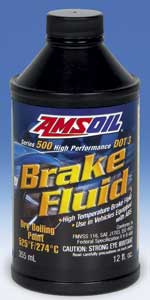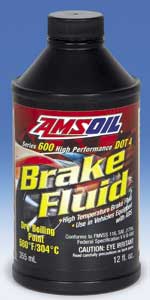Goodoil4u News
AMSOIL Now Offers Brake Fluid
November 01, 2007 02:10 PM Pacific Time
AMSOIL and Injen Partner to Introduce the Injen/AMSOIL Power-Flow Diesel Intake System
2007 SEMA ShowLAS VEGAS--(BUSINESS WIRE)--AMSOIL announces the launch of a new Ea air filter specifically designed for newer diesel engines. To get that product to market in a complete assembled kit, AMSOIL has partnered with Injen Technology. The product will be marketed as the Injen/AMSOIL Power-Flow Diesel Air Intake System distributed by both AMSOIL Dealers and traditional Injen channels.
The new series of intakes features the innovative patent pending Variable Induction Technology, Diesel Power-Box and the dry media Ea nanofiber technology air filter from AMSOIL.
Key benefits include:
- Regulated increased airflow into the air chamber for quiet operation and more power on demand. Nanofiber technology is 99.53% efficient. The 360 accordion style AMSOIL Ea filter element provides 500% more surface area. AMSOIL Ea filters are cleanable with a shop vac.
- Stainless steel pre-filter deflects larger on or off road debris, preventing premature build up of dirt.
- A highly polished or wrinkled black cast aluminum air intake tube and Diesel Power-Box adds a look to any engine bay.
- Glass filled nylon/polypropylene composite mix will not distort under extreme temperatures.
- Power-Box designed to suppress unwanted sound while controlling airflow.
- Tapered plenum reduces turbo lag.
Ea Air Filters use a proprietary composition incorporating special grade cellulose media and nanofiber technology.
Benefits include:
- Superior efficiency because dust remains on filter surface
- Higher capacity of fine dusts
- Cleanable media for extended service life
- Reduced engine wear
Also Now Available for Gasoline Engines.
The Growing Diesel Performance Market
The increased popularity of diesel engines has increased demand for performance parts and accessories.
Surveys reveal that public perception of diesel engines has improved in recent years. A recent TechnoMetrica Market Intelligence survey showed 51 percent of respondents believe modem diesel engines are not the under-performing vehicles they once were, and 50 percent agree diesel engines are more fuel efficient than gasoline engines. In addition, respondents revealed they are willing to pay up to $1,700 extra for better fuel efficiency in a vehicle. This is significant because diesel engine options for light-duty passenger cars typically cost between $1,000 and $1,500 more than standard gasoline engines.
Gale Banks of Gale Banks Engineering predicts the diesel market share for cars and 1/2 ton pickups will grow to 16 to 18 percent over the next 15 years. The media has played a role in helping the public become receptive to diesel engines as performance-capable alternatives to gasoline engines. A growing number of publications are providing positive press for diesel engines, while an increasing number of companies in the diesel performance market are advertising in these magazines. In fact, the total number of advertising pages purchased by performance diesel companies in Diesel Power magazine soared 330 percent between 2005 (134 pages) and 2006 (577 pages).
As diesel engines have become cleaner, quieter and more powerful over the past several years, a surge is becoming evident in the heavy-duty diesel pickup and light-duty diesel vehicle performance markets. According to a SEMA Automotive Lifestyles survey of diesel enthusiasts, the top three specialty equipment performance part purchases in 2006 were exhaust kits, air intake performance air filter replacements and cold air intake conversions. Reported purchases of performance air filters increased from 38.5 percent in 2005 to 50.1 percent in 2006, while purchases of cold air intake conversions more than doubled from 20.5 percent in 2005 to 45.6 percent in 2006.
The survey also reveals a growing number of these consumers are turning to the internet to purchase parts and accessories. These internet purchases have come largely at the expense of custom shop/installers, with 17 percent of respondents reporting purchasing from a custom shop/installer, down from 36 percent in 2005.
A growing number of publications are providing positive press for diesel engines, while an increasing number of companies in the diesel performance market are advertising in these magazines.
|
Top 20 Diesel Specialty Equipment Purchases |
Where Diesel Enthusiasts Purchase Specialty Equipment |
||||
| Product | 2006 | 2005 | Retail Channel | 2006 | 2005 |
| Exhaust Kit - Pipes/Muffler/etc. | 53.1 % | 53.8% | Internet Retail Store Website | 28% | 13% |
| Air Intake - Performance Air Filter Replacement | 50.1 % | 38.5% | Custom Shop/Installer | 17% | 36% |
| Air Intake - Cold Air Intake Conversion | 45.6% | 20.5% | Independent Parts Store/Installer | 13% | 13% |
| Engine Performance Chip/Computer | 42.9% | 35.9% | Do Not Know | 10% | 5% |
| Window Tinting/Lamination | 38.3% | 43.6% | Specific Brand/Manufacturer's Website | 7% | 10% |
| Floor Mats - Custom | 33.7% | 38.5% | Catalogue Mail Order | 7% | 5% |
| Tires - Plus-sized | 33.7% | N/A | Auction Website | 6% | 5% |
| Alarm System | 33.4% | 17.9% | Chain Auto Parts Store | 4% | 8% |
| Gauges - Custom | 32.6% | 28.2% | Magazine Mail Order | 4% | 0% |
| Satellite Radio | 28.3% | 15.4% | Vehicle Dealership | 1% | 5% |
| Wheels - Custom | 24.8% | 33.3% | Car/Truck Show | 1% | 0% |
| Springs/Shocks/Suspension/Sway Bars | 24.5% | 33.3% | Retail Department Store | 1% | 0% |
| Stereo - CD Changer | 24.5% | 25.6% | Not Applicable | 1% | N/A |
| Exterior Lighting | 24.0% | 15.4% | Newspaper Classifieds | 0% | 0% |
| Turbocharger | 22.4% | 17.9% | |||
| Grille - Custom | 22.1% | 17.9% | |||
| Suspension - Lift Kits | 20.5% | 17.9% | |||
| Tires - Performance | 20.2% | N/A | |||
| Fog Lights - Custom | 19.4% | 30.8% | |||
| Stereo - Amplifier | 19.1% | 23.1% | |||
| Source: SEMA | |||||
AMSOIL offers premium quality Ea Air Filters and Ea Universal Air Induction filters ideal for the gasoline and diesel performance markets.
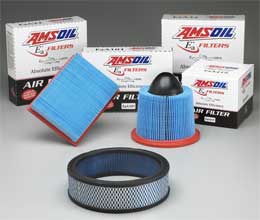 Ea
Air Filters
Ea
Air Filters
AMSOIL Ea Air Filters incorporate nanofiber technology which has been
used exclusively in severe and heavy duty applications. AMSOIL Ea Air
Filters are more efficient and have greater capacity than cellulose and
wet gauze filters, effectively extending engine and filter life and
reducing engine wear. Cleaning of Ea Filters with a shop vacuum or low
pressure shop air is recommended every 25,000 miles or one year, and they
have a total service life of 100,000 miles or four years.
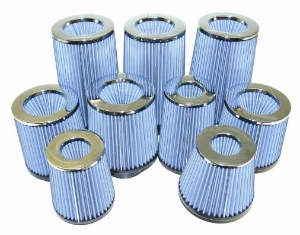
Ea Universal Air Induction Filters
AMSOIL Ea Air Induction Filters are constructed of advanced nanofiber technology and fit most popular air intake systems on the market, providing improved cold air intake and excellent efficiency for superior engine protection and performance. Ea Air Induction Filters are cleanable and remain serviceable for long filter life, saving money on filter costs. Cleaning-of Ea Air Induction Filters with a shop vacuum or low pressure shop air is recommended when designated by the restriction gauge or according to operating conditions.
Source Amsoil DirectLine November 15 2007
European Oil for European Vehicles
AMSOIL Synthetic 5W-40 European Car Formula surpasses the requirements of the most stringent European motor oil specifications.
Motor oil and motor oil specifications are quite different between the United States and Europe. Due to government corporate average fuel economy (CAFE) requirements, U.S. motor oil specifications place more importance on fuel economy. European specifications place more emphasis on engine protection due to the longer recommended oil drain intervals in Europe. Differences between American and European vehicle designs also affect the requirements placed on motor oils. European vehicles tend to be equipped with smaller engines with higher power densities, while American vehicles are larger and have larger displacement engines.
The American Petroleum Institute (API) has one current motor oil specification for gasoline engines and another for diesel engines, while the European ACEA system has multiple light duty oil specifications for gasoline and diesel engines. Individual automotive manufacturers select one of the specifications and usually add their own stringent requirements. When an oil is approved by a specific manufacturer, it is simply added to the manufacturer's approved list.
Due to the high motor oil quality standards, both motor oil prices and recommended drain intervals are substantially higher in Europe than in the U.S. Typical oil drain intervals are between 10,000 and 18,000+ miles and an oil change can cost hundreds of dollars. Since each manufacturer has its own specific motor oil requirements, most consumers bring their vehicles to the dealer for oil changes.
Using conventional American motor oils in European vehicles will usually not fulfill that vehicle's requirements. Therefore, offering motor oils that fulfill European OEM specifications gives retail outlets and quick lubes a distinct advantage over their competition, allowing them to reach a new segment of customers and increase sales.
Offering motor oils that fulfill European OEM specifications gives retail outlets and quick lubes a distinct advantage over their competition, allowing them to reach a new segment of customers and increase sales.
AMSOIL Synthetic 5W-40 European Car Formula
AMSOIL Synthetic 5W-40 European Car Formula (AFL) is specially
formulated for the lubrication needs of most modern European gasoline and
diesel cars and light trucks. Formulated with advanced synthetic base
stocks. premium additives and a 5W-40 viscosity rating. Synthetic European
Car Formula is the preferred oil for nearly all European automobiles. It
is one of the only oils in North America to be recommended for the latest specifications
of all three major European automakers - Volkswagen (Audi). BMW and
Mercedes-Benz, as well as the latest North American API specification.
AMSOIL Synthetic 5W-40 European Car Formula is formulated to surpass the most demanding European specifications. It is recommended for European and North American gasoline or diesel vehicles requiring any of the following worldwide specifications:
- API SM/CF
- ACEA C3-04
- ACEA A3/B3-04
- ACEA A3/B4-04
- ACEA C3
- BMW LL-04
- Mercedes Benz 229.31, 229.51
- Porsche
- Saab
- Volvo
- Volkswagen 502.00, 505.00, 505.01
- DaimlerChrysler MS-10725
Source Amsoil DirectLine October 15 2007
Fuel Quality Poses Threat
Today’s fuels vary in quality and additive treat levels from the refinery. Although a certain level of detergent additive is required by law to be formulated into gasoline, cost restrictions cause refineries to use low quality additives in the lowest additive concentration (LAC), a level insufficient to prevent deposit accumulation. Deposits accumulate on fuel injectors, intake valves and combustion chambers within just a few thousand miles, disrupting spray patterns, affecting electronic sensors and causing a multitude of problems. Fuel system deposits result in the following:
- Lost fuel economy
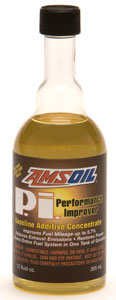
- Lost power and poor throttle response
- Failed emission tests
- Poor drivability - surging, hesitation, stalling, rough idle
- Engine knocking (pinging) and rap
- Difficult starts
The newly formulated AMSOIL PI Performance Improver is the most potent gasoline additive available today. As a concentrated detergent, it is unsurpassed in cleaning combustion chamber deposits, intake valve deposits and port fuel injector deposits, eliminating the need for expensive fuel injector cleaning procedures. It is ideal for use prior to emissions inspections, and it helps maintain peak engine efficiency, fuel economy, power and drivability in newer low mileage engines. In engines with accumulated deposits, testing showed AMSOIL PI provided the following clean-up benefits after only one tank of gasoline:
- Improves fuel mileage an average of 2.3% and up to 5.7%
- Reduced emissions
- hydrocarbons (HC) up to 15%
- carbon monoxide (CO) up to 26%
- nitrous oxides (NOx) up to 17%
- Restored power and performance
- Reduced need for costly higher octane fuel
- Reduced noise from carbon rap and pre-ignition
- Better drivability
- Smoother operation
The new PI formulation offers greater potency and delivers additional benefits, including increased fuel economy improvements, improved intake valve and combustion chamber cleaning and lower emissions. Because it is recommended every 4,000 miles, rather than with every tank of gas, the new PI formulation is also more convenient to use. Its new smaller neck makes it easier to pour into the tank, and because the flip top has been eliminated, leakage is minimized.
Ford Increases Recommended Oil Change Intervals
Ford Motor Company recently extended its recommended motor oil change interval from 5,000 to 7,500 miles under normal service conditions. The change applies to select 2007 models and all 2008 models. According to Ford fuels and lubricants engineering supervisor Pete Misangyi, Ford based its decision on the improved quality of engine oils and engines. “Severe duty was also upped to 5,000,” said Misangyi. “So that one went up from 3,000 as part of the same change.” Last year, Ford increased its recommended oil change interval for diesel engines operating under normal service from 7,500 to 10,000 miles.
5W-20 Increases Fuel Economy
Ford Motor Company reports that the company’s switch from recommending 5W-30 viscosity motor oil to 5W-20 viscosity motor oil has saved 700 million gallons of gasoline since 2001. By reducing load and internal friction, lighter viscosity 5W-20 motor oils reportedly increase fuel economy by a half mile per gallon. In addition, Ford reports its use of 5W-20 oils has reduced carbon dioxide emissions by about one million metric tons a year. AMSOIL Synthetic 0W-20 Synthetic Motor Oil (ASM) and XL 5W-20 Synthetic Motor Oil (XLM) deliver outstanding fuel efficiency and superior wear protection over competing synthetic and conventional motor oils.
Proper Wheel Bearing Maintenance
 AMSOIL Synthetic Multi-Purpose Grease provides
superior protection for automotive wheel bearings.
AMSOIL Synthetic Multi-Purpose Grease provides
superior protection for automotive wheel bearings.
According to Brake & Front End magazine, because wheel bearing failure can cause loss of steering control and separation of the wheels from the vehicle, indications of wheel bearing problems cannot be ignored. The first symptom of trouble is usually a rumbling, growling. chirping or cyclic noise from the wheels. This noise is often proportional to driving speed, but unlike differential, transmission and U-joint noises, it does not change when accelerating. coasting or decelerating. Although the noise may change while turning. it should not be confused with the noise created by a worn or damaged outer CV joint on a front wheel drive car, which usually makes noise only when the vehicle is turning. not when driving straight.
A recent trend in the automotive industry is the return of serviceable wheel bearings. The 2WD Ford F-Series and GM Colorado and Canyon models, for example, feature wheel bearings that are not factory-sealed. While a problematic sealed bearing assembly must be replaced, serviceable bearings may be removed. disassembled. cleaned and inspected. If the rollers. balls and races show no signs of wear, pitting, cracking or damage, they may be reused.
Factory-sealed wheel bearing and hub assemblies do not require re-greasing and have a typical life expectancy of between 85,000 and 100,000 miles, while serviceable bearings typically call for cleaning, inspection and repacking with fresh, clean wheel bearing grease at 30,000 mile intervals. Brake & Front End recommends use of a quality high temperature wheel bearing grease, such as a #2 NLGI lithium-based grease, or a synthetic wheel bearing grease.
In order to remove contaminants, the old grease should be removed and the bearings cleaned and inspected prior to repacking them with fresh grease. Because used seals can leak and contaminate brake linings or lead to premature bearing failure. new grease seals should be used when installing wheel bearings.
When a vehicle experiences a wheel bearing failure. it is a good idea to pay close attention to the other hubs on the vehicle. especially if the vehicle has a lot of miles. If one bearing has failed, chances are the other bearings require service as well.
AMSOIL Synthetic Multi-Purpose NLGI #2 Grease (GLC) provides superior protection and performance in automotive wheel bearings. Composed of premium quality synthetic base oils and lithium complex thickeners. Multi-Purpose Grease provides superior film strength, shear resistance, adhesion properties and mechanical stability. and it excels in temperature extremes.
Superior Transmission Protection
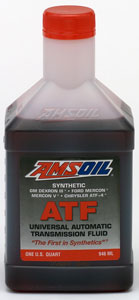 AMSOIL Synthetic ATF is recommended for the latest manufacturer specifications.
AMSOIL Synthetic ATF is recommended for the latest manufacturer specifications.
Automatic transmission technology has been quickly evolving over the past few years. Six-speed transmissions are becoming more common, and automakers are demanding higher quality, longer lasting transmission fluids to protect these transmissions.
General Motors. for example. recently introduced its DEXRON@ VI specification. Established to provide extra protection for 2006 vehicles equipped with six-speed HydraMatic transmissions. DEXRON VI fluids are also recommended for transmissions built before the 2006 model year. DEXRON VI represents a significant upgrade over previous specifications. In order to minimize fluid degradation and ensure improved performance in extreme conditions, DEXRON VI fluids require greater oxidative and shear stability, foam performance and protection against pitting. According to GM, DEXRON VI fluids provide more than twice the durability and stability in friction tests than fluids meeting previous specifications.
Ford Motor Company, on the other hand, recently announced the retirement of its MERCON® automatic transmission fluid
specification, opting to promote its more stringent MERCON® V specification that requires improved anti-oxidation,
anti-wear and anti-shudder properties. Ford also introduced its MERCON® SP specification in 2004.
Designed for high torque six-speed transmissions, MERCON SP fluids have lower viscosity requirements and more
stringent cold-temperature Brookfield viscosity requirements.
DEXRON VI fluids provide more than twice the durability and stability in friction tests than fluids meeting previous specifications.
AMSOIL Synthetic Automatic Transmission Fluid (ATF) exceeds the performance requirements for domestic and foreign automatic transmission fluid applications, and is now recommended for cars and trucks calling for DEXRON VI, MERCON V & sp, NAG I & 2 and Nissan Matic J & K transmission fluids. AMSOIL ATF provides automatic transmissions, power steering units and hydraulic equipment with excellent lubricating protection and better performance over a wider temperature range than conventional automatic transmission fluids.
- Resists thermal and oxidative degradation
- Ensures cool transmission operation
- Provides outstanding low temperature protection
- Improves fuel economy
- Provides smooth shifting
- Maximizes transmission performance and service life
- Reduces maintenance costs
- Offers extended drain intervals
AMSOIL Synthetic Automatic Transmission Fluid is recommended for use up to 60,000 miles in severe service and up to 100,000 miles in normal service, or according to the vehicle manufacturer recommended intervals, whichever is longer. Drain intervals may be extended further with oil analysis.
AMSOIL Synthetic ATF is recommended for transmission. hydraulic and other applications requiring any of the following specifications:
- GM DEXRON II, III & VI
- Ford MERCON. MERCON V & SP
- Chrysler ATF+ through ATF+4®
- Honda Z-1 (Not for use in CVT transmissions)
- Toyota Type T and T-IV
- Mitsubishi/Hyundai Diamond SP II & III
- Allison C-3, C-4, Caterpillar TO-2
- Voith G607, G1363
- ZF TE-ML 14A, B & C
- MB 236.1, 236.2, 236.6, 236.7, 236.9
- BMW 7045E. JWS 3309. NAG 1 & 2
- LT 71141 (ESSO). Nissan Matic D. J & K
- Vickers I-286S & M-2950S
Excellent For power steering units that use ATF. Not for use in CVT transmissions.
Improve Fuel Economy in Four-Wheel Drive Vehicles
Four-wheel drive vehicles often receive poor fuel efficiency. Four Wheeler Editorial Director Douglas McColloch offers the following tips for increasing fuel efficiency in four-wheel drive vehicles:
-
After installing bigger tires, re-gear the axles to ensure optimal engine rpm at cruising speeds. The speedometer should also be recalibrated.
-
If running a three-speed transmission. consider an overdrive unit. A manual transmission also provides an increase in fuel efficiency.
-
Ensure the engine and fuel-delivery system are tuned. Improper carb jetting, clogged injectors and filters, improperly gapped spark plugs and worn out 02 sensors, can all decrease fuel economy.
-
Install freer-flowing aftermarket air filter and exhaust components that improve intake and exhaust flow.
-
Use synthetic lubricants for reduced wear. better viscosity retention and longer service intervals.
-
Keep tires properly inflated and wheels aligned.
-
Install an electric cooling fan to replace the stock belt driven fan.
-
Shed excess weight such as lightbars, nerf bars, side steps, jerry cans, auxiliary lights and storage boxes during the winter months.
-
Turn off the AIC when it is unnecessary.
-
Avoid short trips, jackrabbit starts and too-high (or too-low) revving.
